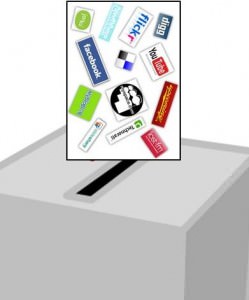Social Media: An Essential Ingredient for Modern Democracy?
 Many academics are presently debating whether a “Twitter Revolution”, a social network for social change, actually exists; however, whatever the outcome of the debate may be, the exciting thought of Twitter tumbling an entire political regime instils new hope in many nations, including the U.S. When Barack Obama was battling the deadlock in the U.S. Congress to raise the debt ceiling before a historic sovereign default, the president started a Twitter campaign to rally his country.
Many academics are presently debating whether a “Twitter Revolution”, a social network for social change, actually exists; however, whatever the outcome of the debate may be, the exciting thought of Twitter tumbling an entire political regime instils new hope in many nations, including the U.S. When Barack Obama was battling the deadlock in the U.S. Congress to raise the debt ceiling before a historic sovereign default, the president started a Twitter campaign to rally his country.
One week before the August 2 deadline, Obama, with 9.4 million followers on Twitter, tried to pressure the Republicans to a compromise. The president, himself, tweeted: “The time for putting party first is over. If you want to see a bipartisan #compromise, let Congress know. Call. Email. Tweet. – BO”.
[pullquote]Social media has unequivocally become an essential ingredient in modern democracy.[/pullquote]
The Americans called. They bombarded the Capitol switchboard and it operated at near capacity. The Americans tweeted. They spammed their representatives with the hashtag to #compromise. Obama spammed too. Over the period of one day, Obama posted more than 100 tweets, giving out more than 230 Twitter handles (or usernames) of Republican lawmakers.
Some liked the campaign, but the overall failure was too apparent. Obama lost an estimated 40,000 followers whose Twitter feeds were flooded by his spam tweets.
@Matt9383: I don’t think @BarackObama understands that sending out massive amounts of tweets in a short period of time is really annoying.
@the_real_cwurst: I just have to feel that @BarackObama’s 9.3M followers are pretty pissed right now that he’s demolishing their feed. Inconsiderate.
@lukeneff: I did the math. It’s going to take @BarackObama six and half hours to get through all the states at this rate.
Success belonged to another Twitter hashtag during the U.S. debt crisis. Jeff Jarvis, a journalism professor at the City University of New York, started the #F***YouWashington trend that has won him a hoard of new followers. Initially wanting to vent some anger, he tweeted: “Hey,Washington assholes, it’s our country, our economy, our money. Stop f***ing with it.” After discovering it was a common feeling, he followed by saying, “People, it’s time to get f***ing pissed off.” And then, “Can we start a Twitter chant: F*** YOU, WASHINGTON! Pass it on.” The hashtag blew up to 20,000 tweets in an hour and more than 36,000 in a day. The network site tried to block the hashtag from trending due to profanity, and it kicked Jarvis off for tweeting too much. But Jarvis’ absence did not matter, because society adopted the trend and continued the conversation. A big speech bubble was created, containing the true voices of disappointed Americans, and if democracy means what it initially promised, these people need to be heard. Social media, once again, made it easier for the government to do just that. The question is whether politicians have the will to listen.
A NEW DEMOCRACY IS CHIRPING
Social media has unequivocally become an essential ingredient in modern democracy. It is indisputable that these media platforms have a strong hold on our daily lives, and they are tightening their grip. The rawness and immediacy of available information encourages more transparency, and we see from the Arab Spring that absolute monarchy struggles to cope with 21st century technology. Now, a larger network of citizens possess a voice that is louder than before, and it is increasingly harder to effectively ignore and oppress them. It will become more difficult for dictating elites to remain elite, to pass power to family members, and suspend democratic constitutions. We may not realize it in the Western world, but this is a significant step towards democracy. “[C]losing options for authoritarian rule has been an important part of democratization. Giving a dictator less room to manoeuvre is as much a part of democratization as is running the first successful election.”, wrote Philip N. Howard, author of The Digital Origins of Dictatorship and Democracy: Information Technology and Political Islam.
It is a long race. There are still many hurdles ahead before these countries can ensure a lasting change. Social media cannot lay down the foundations for political, social or economic reforms, but it has provided us a virtual salon(like those inEuropebetween the 16th-18th centuries) where conversations and sharing of ideas can be translated into action that leads to a significant change.
In the case of the U.S. debt crisis, although Obama and his staff reaped minimal benefits from the Twitter campaign, it opened the world to the possibility of a new model of leadership. Social media possess the power to drive public mobilization and citizen engagement. The nation can be heard in a new way, and we are encouraged to question the traditional method of linking the government with its people and vice versa. This is the future of democracy.
ARB Team
Arbitrage Magazine
Business News with BITE.
Liked this post? Why not buy the ARB team a beer? Just click an ad or donate below (thank you!)
Liked this article? Hated it? Comment below and share your opinions with other ARB readers!






























Share the post "Social Media: An Essential Ingredient for Modern Democracy?"